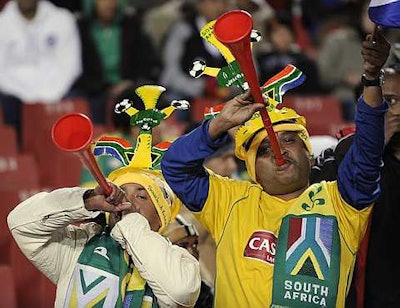My 10-year-old son is on the disabled list this summer, his right arm encased in a hefty shoulder-to-hand cast. Otherwise, I'm sure he would have found better things to do on Friday morning than watch the first game of the World Cup. That match ended in a 1-1 tie between South Africa and Mexico, a dull score that I thought would break my son's World Cup fever. But there he was on Sunday, sitting in front of another World Cup broadcast, and this time my wife was intently watching Ghana knock off Serbia with him.
What was going on? Neither mother nor son had shown much interest in soccer or expressed their intentions to while away the weekend watching matches featuring players from countries my boy can't even locate on a map. As things turn out, both of them had been lulled into a trance-like state, thanks to the incessant, droning buzz of the vuvuzela that dominated television broadcasts of the matches.
The stadium horn, a fan favorite in South Africa, measures more than three feet long and has been known to emit as many as 144 decibels - that's louder than an air horn or a passenger jet. Imagine standing in front of a vuvuzela blower. Not only would you be subject to a noise that some commentators have referred to as "a goat on the way to slaughter," "a stampede of noisy elephants" and "a giant hive full of very angry bees" for 90-some minutes, but permanent hearing loss, to boot.
No wonder fans, broadcasters and players are complaining. "It is impossible to communicate, it's like being deaf," Argentina's Lionel Messi told the UK's Daily Telegraph. In the wake of FIFA threatening to ban the din-making instruments if any are thrown onto the pitch or used as a weapon - and urging fans to refrain from being obnoxious long enough to not blow them during national anthems - the vuvuzela's manufacturer today announced plans to modify the mouthpiece in order to reduce, by about 20 dB, the volume produced. Gee, that'll help. Plus, with almost one million of the louder version manufactured, sold and already in the hands of fans, that move is not likely to have much impact on the next four weeks of World Cup action.
 vuvu.wordlcup2.jpg
vuvu.wordlcup2.jpg
Home viewers might find some aural relief - thanks to Clemence Schlieweis, a 29-year-old recording and mixing engineer in Germany, who claims to have created a 45-minute MP3 audio file (called the Anti Vuvuzela Filter) that, if played on a computer placed near television speakers, cancels out the vuvuzela's din. The soundwave boasts the same aplitude of the vuvuzela but with the peaks and valleys of the wave inverted.
Meanwhile, in four days, the Original Official Ban the Vuvuzela Facebook Petition page has garnered more than 150,000 supporters - nearly 13,000 in a matter of hours on Monday afternoon - some of whom welcome the vuvuzela during matches involving South African teams but find the blaring of the horns disrespectful during other nations' matches in which their own fans' cultural traditions (typically singing and chanting) are drowned out. Another ban supporter posted this: "My South African friend on Facebook just sent me a message. Her throat hurts from blowing the darn thing, so now she is against it and won't blow it anymore."
South Africans' sore throats may be what save the rest of the world's bleeding ears. For now, I'm going to suggest my wife and son watch future World Cup matches with the volume low. Real low.
What do you think? Should the vuvuzela be banned at the World Cup? And are noisemakers allowed at events staged in your facilities?




































